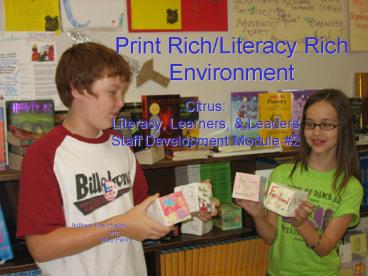Print Rich/Literacy Rich Environment - PowerPoint PPT Presentation
1 / 17
Title: Print Rich/Literacy Rich Environment
1
Print Rich/Literacy Rich Environment
- Citrus
- Literacy, Learners, Leaders
- Staff Development Module 2
- Authors Kay Harper
- and
- Mary Perrin
1
2
The Seven Processes of Literacy are
- Listening
- Viewing
- Thinking
- Expressing through
- multiple symbol systems
- Speaking
- Reading
- Writing
-
(Taylor)
3
Daily Non-NegotiablesEach teacher will
- Have a print-rich/literacy-rich environment
- Use the seven processes of literacy
- Read to and with students
- Teach, model, and practice strategies of
- expert readers and writers.
- Have students read independently
- with accountability
- Instruct phonics and phonemic awareness
- in K/1, and for others who have not
- reached mastery.
4
What is a print-rich/literacy-rich environment?
- A classroom that is print-rich/literacyrich,
exposes and engages students in the seven
processes of literacy for a variety of authentic,
everyday purposes across the content areas.
4
5
Research says
- Immersion in language has an effect on
students writing, on their reading, and on their
thinking and talk. (Janet Allen, 2000) - Print-rich environments are
- necessary for children to
- learn literacy.
- (Allington
and Johnston,2001)
6
What Does It Look like?A print-rich/literacy-rich
classroom should include the following
- Printed materials
- Non-print materials
- Technology
- Student created products
7
Print Examplesin a print-rich/literacy-rich
classroom
- Classroom libraries
- Novels
- Trade books
- Textbooks
- Non-fiction books
- Picture books
- Poetry
- Art/music books
- School yearbooks
- Teachers personal reading materials
7
8
More Print Examplesin a print-rich/literacy-rich
classroom
- Charts/graphs - instructional
- Charts/graphs - organizational
- Student journals
- Student/teacher published work
- Student work displays
- Magazines
- Word walls student generated
- Posters/advertisements
8
9
Word Walls
- Student generated
- Evolving change it periodically
- Connected to content
- Organized in a useful way
- Used as an instructional resource
9
10
What does a classroom library look like?
- Organized in a way that makes sense to kids
- Purposefully organized
- Lots of non-fiction
- Various levels
- Various genres
10
11
Non-print Examplesin a print-rich/literacy-rich
classroom
- Rich talk
- (academic language)
- Book Talks
- Games/puzzles
- Art/music
- Student work
- Read alouds
- Free reading time
- Independent reading with accountability
11
12
Alternatives for Accountability
- Book talks
- Reading logs
- Advertisements
- Projects
- Readers Theatre
- Book Clubs
- Journals
- Character Portrayals
- Graphic Organizers
- Remember
- Accountability needs to offer choice.
- Choice is a motivator.
12
13
Read Alouds
- RISK FREE for students
- Models fluency
- Stimulates discussion
- Exposes students to a wide variety of literature
- Helps students develop interest
- for later self-selection
- Builds extends content area knowledge
- Develops observation and listening skills
- Builds mental models
- Gives access to on grade-level texts
13
14
Easy Preparation for Read Alouds
- Not just for extra time it is instructional!
- Practice BEFORE you read to students
- Know your audience and choose selection
accordingly - Choose a consistent time great for transitions
- Show passion!
- Choose a good stopping place
- Set student expectations
- Be prepared to
- extend the read aloud
14
15
Technologyin a print-rich/literacy-rich classroom
- Listening station
- Interactive software
- On-line research
- Video Clips not an entire movie!
- Exampleunitedstreaming.com
16
How do I know if a classroom is
print-rich/literacy rich?
- It should have displays with books of all genres
and a plethora of student work. - You can tell what the kids
- are learning from the
- artifacts in the room.
- (Taylor)
17
An A-Ha Moment
- Its impossible to sleep in here. Your head
falls back and you open your eyes and there are
all these words staring at you from the ceiling. - - Warren , a high-school student
- Your Commitment???
17

